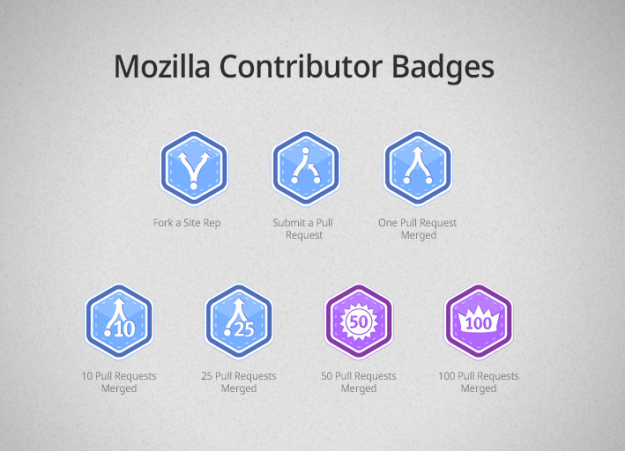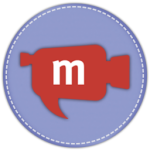Our work within Mozilla—co-creating great open source software, working with longstanding contributors, interacting with our larger volunteer community—ties in perfectly with badges. Recognizing people for being great at their jobs, acknowledging active collaborators, encouraging folks to deepen their participation is a no-brainer for a community-built and community-reliant organization like ours. Consequently, we’ve begun to develop and pilot internal badge systems within different areas of the organization. Not surprisingly, this growing group of Mozilla badge systems is revealing itself as fertile ground for investigating the development of a variety of badge systems.
Because we work in the open, because many people might find our badging work to be useful as background research into their own work, because we’re large enough that not everyone here is yet aware of the badge design work that’s happening at Mozilla, and because a number of folks have been inquiring about where they might earn badges, I’ve gathered all the badge work that is currently underway or planned for 2013 into this single blog post.
Some Mozilla badge systems pertain directly to education and learning, some are more heavily focused on capturing and acknowledging prior work, while others are based on encouraging greater commitment to the community. Different badges for different requirements and all of it happening under the Mozilla tent. Nice.
The list of Mozilla badges for 2013 (in very loose chronological order):
- Webmaker badges
- Web literacy standard badges
- WebDev badges
- Capture Mozilla badges
- Webmaker Mentor badges
- SUMO badges
- Engagement badges
- QA badges
- MDN badges
- Student reps badges
- Creative badges
- Affinity badges
- Air Mozilla badges
Webmaker Badges
Many of you are familiar with the Webmaker badges that we debuted at MozFest last year. Those included mini-skill badges earned for learning basic aspects of html and css, along with badges for activities and participation at MozFest 2012. Good news! We have more planned for the coming year. In fact, I’ve just written a great shareable tweet for webmaker badges and I’ll share it here because, this summer it’s going to come true. “Coming soon: Mozilla #webmaker badges built on the community-driven Mozilla #weblitstd; assessed and awarded by peers to peers.”
No doubt by now you’re curious. “What are the peer assessed badges that I will be able to earn this summer?” Good question. Here’s what will be available: badges for remixing, HTML, CSS, composing for the web and credibility. But how did we arrive at these? There’s something more at work here, and that brings us to our next badge system.
Web Literacy Standard Badges
If you haven’t been following our work with Web Literacy, there’s still time to get in on the action. We’re working with the Mozilla community to develop a web literacy learning standard. A standard to which organisations may choose to voluntarily align. We’ve made great headway and we’ve just announced our first Web Literacy Standard draft! For those of you who need a TL;DR of this work, here’s another tweet length explanation, “Co-creating a web literacy standard w/ the Mozilla community. Addressing assessments & badges. Join us: http://mzl.la/106TtlP #weblitstd” Feel free to share that statement on your twitterstream.
Over the last month or so we’ve worked through a mountain of content to a series of areas that we’re calling strands for now. There are three primary strands: Exploring, Building and Connecting that are composed of competencies like remixing, HTML, CSS, sharing, credibility, collaboration, security and privacy. These competencies will be used as a foundation for web literacy badges. Web literacy badges that you’ll be able to earn accomplishing projects here at Mozilla, but that you’ll also be able to earn for work done elsewhere on the web. With the development of these badges we will accomplish our goal of developing a distributed learning environment as well as a distributed badging network, stewarded by an organization dedicated to keeping the web open and free. That’s hard to beat.
I’ll certainly have more to share about web literacy badges again in the future. Indeed, here are two “-quel” badge pathways posts to further explain where we’re headed with the web literacy badge work.
WebDev Stewards Badges
We were really excited to hear that the Web Development stewards were interested in issuing badges recognizing the meaningful contributions that volunteers have been making to Mozilla over the years. They had already put together some basic criteria and done some preliminary thinking about what their badges should represent and how they should be awarded. With that much work already considered, the team felt emboldened to try something new with this endeavor: working with the community to develop the designs for these badges. Considering that these badge represent community participation, it made a sort of beautiful sense to us that they be designed by community members. And so they were.
We received a number of really wonderful designs, some of which made us think hard about what we were communicating through the visual designs and some of which just made us say, “ahhhhh.” There’s much more to say about badge visual design and we’ll cover that in a future post, but I’ll note here that these designs correlate quite nicely with the subject matter that they’re meant to represent. Friends, this is no small feat. Kudos to the team on that. I wrote a bit about these before and I’ll revisit the process of getting to the final product in another post, but for now I’ll just let these badges speak for themselves. (To learn a bit more about our design process, read this fine post by John Slater.)

Capture Mozilla Badges
I learned of the Capture Mozilla badges through a surprise posting on Yammer. Learning about these badges was like earning a stealth badge—surprising and delightful. Mozilla team members finding ways to acknowledge their contributors in ways that are public and shareable through Open Badges. Yes! Of course, we were excited to hear about it and we reached out to Dia Bondi, who along with Sean Bolton and Dino Anderson, is endeavoring to encourage people to contribute to the Mozilla repository through recording their experiences on video, even in less than perfect ways. Knowledge permanently captured is knowledge that continues to work.
Attempting to counter the inaccurate notion that on-camera skill is required or that a lot of preparation is involved, Capture Mozilla turned to badges as a way to be able to “talk about [the] project in a way that acknowledges other people’s contributions.” The team is thinking about the next steps for Capture Mozilla badges, in particular deepen the badging structure. Dia notes that “badging will allow the project to scale.” Music to our ears. People, earn those badges!

Webmaker Mentor Badges
The Webmaker Mentors group is tearing it up with their work on the Webmaker MOOC, “Teach the Web” that is taking place May through June. The team is testing out a number of theories with this work. And they’re integrating badges into their approach. They’ll be offering a series of four Mentor badges. These badges are nicely reflexive in that they reinforce the very thing they seek to recognize, because when you earn the Mentor badge, you in turn become able to review other people’s work for mentor badges. All in all, a great system that encourages community participation while also acknowledging learning and growth. By the way, these badges will also help folks ramp up for Maker Party 2013: Learn, Remix, Share—coming to you this summer (or winter, depending on which hemisphere you call home).
SUMO Badges
SUMO badges are in the planning stages. Roland Tanglao is busy working his way through some foundational aspects of this badge system. For those of you who are curious as to how this comes together, you might be interested in taking a look at the fun google spreadsheet I’ve devised to helps folks (and myself) think through content.
Engagement Badges
With the recent Firefox OS work, it sort of makes sense that we’d want to start acknowledging peoples’ participation through badges. Emily Goligoski has been working with Chelsea as Engagement start thinking through their four proposed badges aimed at Mozillians and Mobilizers who have participated in Firefox OS launch activities: Firefox OS Events, Firefox OS Trainer, Firefox OS Launch Day and Firefox OS Core Team. It’s still early days and these may change, but suffice it to say that they’re on their way to acknowledging their contributors in a new and dynamic way.
QA, MDN, Student Reps, Creative, Affinity, Air Mozilla
We’re very much looking forward to working with these groups to implement badges. Certainly, QA, Mozilla Developer Network (MDN), and Creative are essential components of what constitutes Mozilla to the outside world. Student Reps provide some of the major firepower behind our offering. Affinity is weighing the options about ways to acknowledge types of commitment, both financial and temporal. They’re also working hard to ensure that their badges have rigor and value associated with them. Air Mozilla is the newest kid on the badges block. This bunch represents a wide variety of potential badges emanating from Mozilla. We can’t wait to work with them to bring them to life.
Thank you!
That’s a quick summary of the groups within Mozilla who are interested in developing badges or are already in progress with them. If I’ve missed mentioning you, or if you’re interested in working on badges in your area, please contact any member of the open badges team: we’re all happy to work with you. We are deeply grateful to the Mozilla folks who have already reached out to the Open Badges team seeking new and innovative ways to enhance their communities, recognize commitments and acknowledge participation. To say that we’re excited about next steps is to significantly understate our enthusiasm. Just a quick heads up on some immediate next steps, shortly we’ll be meeting with Annie Elliott to begin thinking through metrics for Mozilla badges: another exciting avenue to explore.
And finally, a quick and specific note of thanks to David Boswell for his fantastic work with the Community Builders and Grow Mozilla teams; he and they are proving to be invaluable partners in the ongoing development of badges here at Mozilla.
—
More soon.
It’s great to see so many teams across Mozilla express interest in this form of recognition. Many of these groups are in different phases of designing and developing their badge systems, and we’re working to create tools to help in the process of issuing badges. Stay tuned!
Pingback: State of the Union: Mozilla Badges | Gamificati...